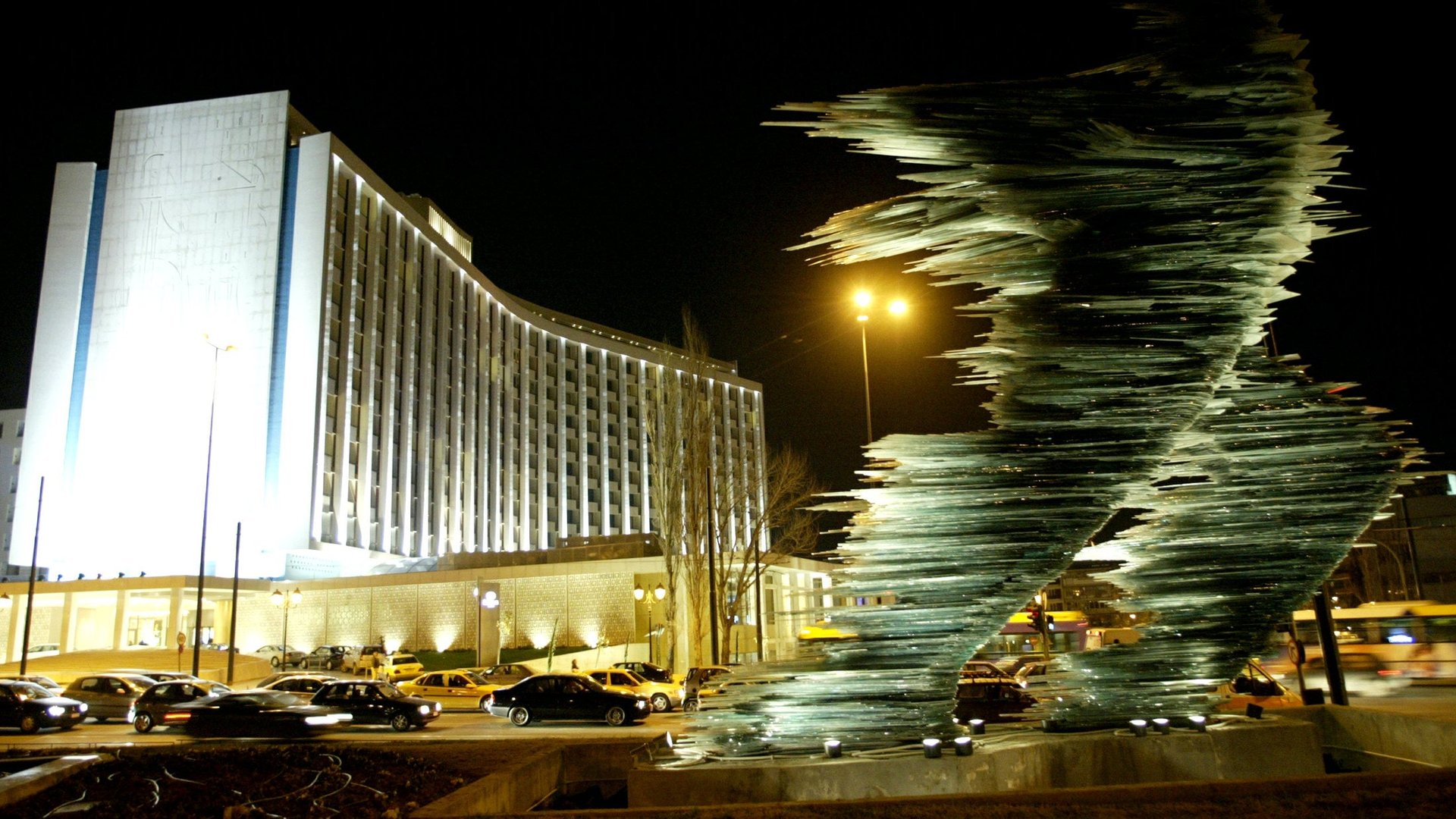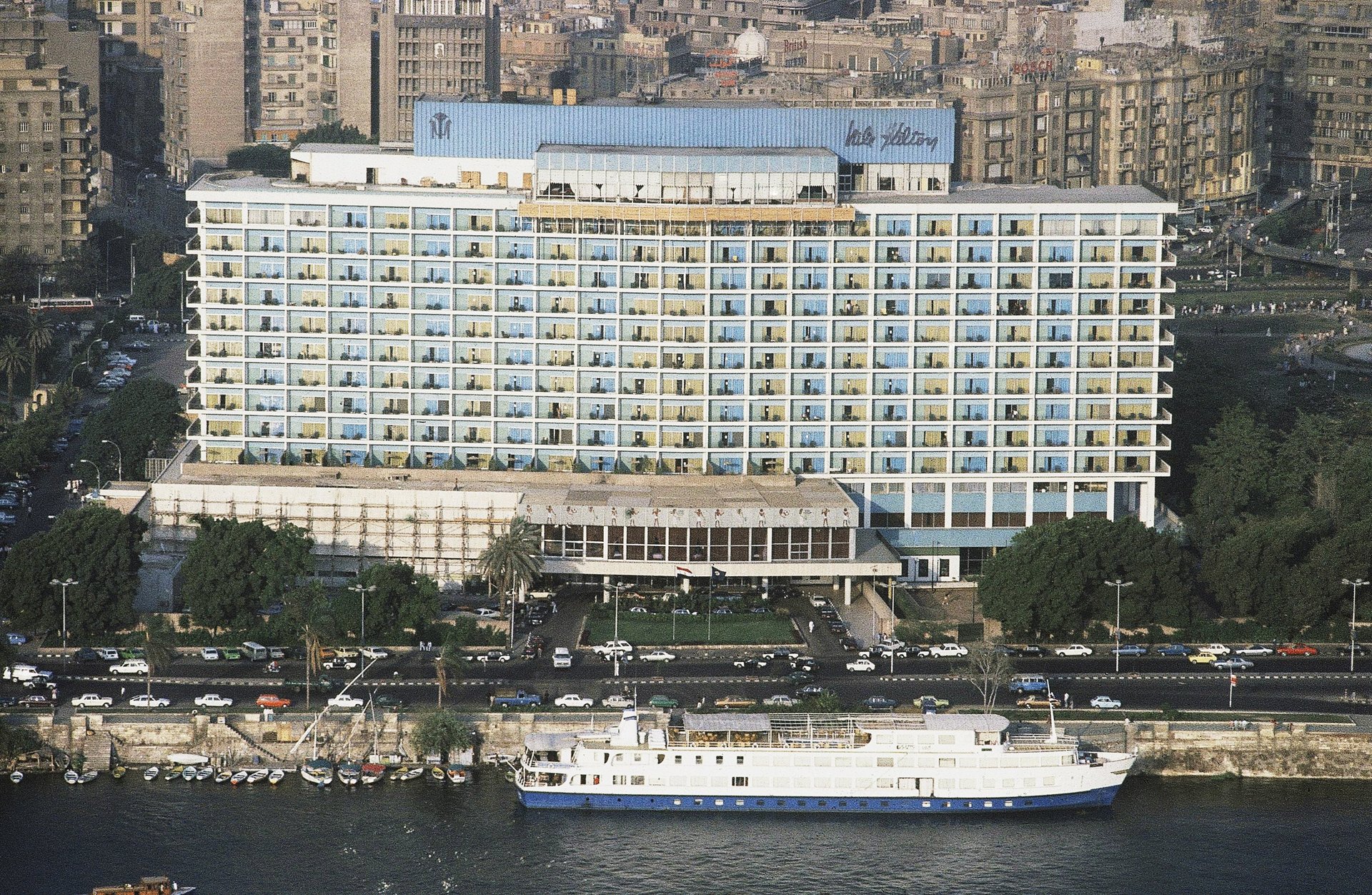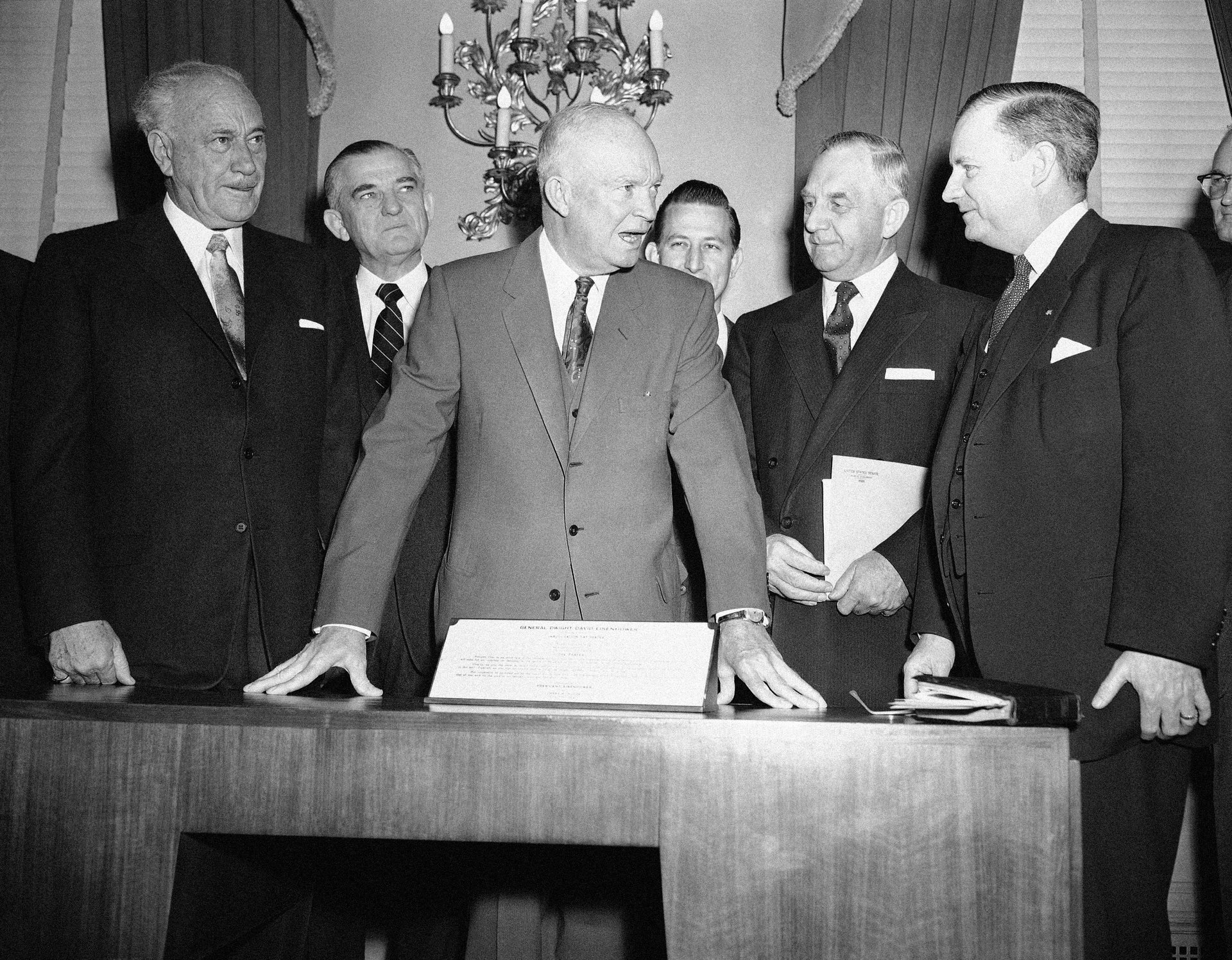How Hilton hotels fought the Cold War with ice water, AC, and burgers
When the Park Lane Hilton opened in London in 1963, on the eastern edge of Hyde Park, Buckingham Palace was reportedly not pleased.


When the Park Lane Hilton opened in London in 1963, on the eastern edge of Hyde Park, Buckingham Palace was reportedly not pleased.
At 28 stories, it was the city’s tallest building—and the first to be higher than St Paul’s Cathedral, 2.5 miles to the east. According to news reports at the time, the Queen had a row of trees planted to hide herself from the prying eyes of tourists stationed on the hotel chain’s top floors. “Buckingham Palace now nestles in a valley of tall buildings” one headline read. It was seen as scandalous that Americans would look down upon the Queen and her palace.
In the thoroughly globalized context of modern day London, the Park Lane Hilton still feels no less American. Its lobby is vigorously air conditioned, has an outpost of the cheerfully tacky Polynesian themed restaurants called Trader Vic’s, and guests with large amounts of luggage sip Starbucks Frappuccinos purchased nearby.
Outside, it remains something of an anomaly on the skyline, which in fact indicates its legacy. Along with several other structures from that era, its construction spurred restrictions on where tall buildings could be placed in London. Planners wanted to avoid turning Hyde Park into Central Park—or an open green space abutted by imposing skyscrapers.
For the famed hotelier, capitalist, and American icon Conrad Hilton, influencing London’s skyline and irking the British monarchy was all in a day’s work. While capitalism is always an evangelical enterprise, Hilton’s global expansion wasn’t just implicitly motivated by an American bravado; it was a driving ideological force. And indeed, with the first generation of overseas hotels Hilton built from 1949 through the mid 1960s—which he dubbed “Little Americas”—Conrad arguably created one of the most subtle, expansive, and successful soft-power exercises the for-profit world has ever known. It’s one that, in many ways, still persists to this day.
“The fruits of the free world”
While the erection of a Hilton tower was not received particularly well in London—a city that already had a tradition of grand and distinctly British hotels like the Savoy and the Dorchester—elsewhere in the world it was a different story. As Duke University professor Annabel Jane Wharton wrote in her exhaustive book Building the Cold War: Hilton International Hotels and Modern Architecture, “the Americanness that made Hilton popular in Berlin, Athens, Cairo, and Istanbul seems to have made it an object of contempt and envy in London.”

In 1955, almost a decade before the London tower debuted, Hilton opened its third international property in Istanbul, Turkey. Wharton writes that in cities like Istanbul, a Hilton hotel was often the “most significant Modern structure in its host city as well as its finest hotel.” The Cold War was raging and, placed just 30 miles from the Iron Curtain in Bulgaria, the Bosphorus-facing Hilton was designed to be a statement. As Hilton wrote in his widely-read memoir Be My Guest: “An integral part of my dream was to show the countries most exposed to communism the other side of the coin—the fruits of the free world.”
In an 1958 edition of Hiltonitems, an in-house publication sent to Hilton employees and quoted in Wharton’s book, Conrad went further, saying his hotels were not just to serve as a symbol, but a charm offensive: “I do not disparage the West’s armament program; we must keep our defense superior to the communist world. I insist, however, that that it is a defense and will not work as an offensive to destroy communism. There you have the reason why, in Istanbul and Baghdad, we are pushing close to the Iron Curtain. We are in Cairo because it is the center of the Moslem [sic] world…We are in Berlin because Germany holds the key to the containment of Europe.”

As Wharton writes, it wasn’t just distinctly American amenities like grassy lawns and tennis courts, pools with scantily-clad guests (in Muslim countries, mind you), and signature “American Modern” architecture that made these properties American. It was, at least in some cases, their funding structure as well. Several Hilton properties, most notably Istanbul, sought or used funding from the Economic Cooperation Administration, which was part of the US government’s Marshall Plan of 1947, formulated to promote stability and stem the tide of communism in Europe.
As Wharton wrote, “The US State Department was certainly aware of the role hotels might play in the expansion and stabilization of capital after World War II,” by stimulating trade and travel and fostering good will among nations. Hilton shrewdly managed to put up little capital for its early international outposts. Instead, Wharton writes, “the construction and equipage of a building was typically paid for by the host state or by private investors in the country, frequently with a subsidy of foreign aid or loans guaranteed by the US.” Where possible, Hilton then secured contracts that would entitle it to a third of a property’s profits in exchange for complete control and management of the hotel.
So once they secured these favorable contracts, how, exactly, did Hilton spread the gospel of Americanism through its hotels? From hamburgers and milkshakes to air conditioning and tapped-in ice water in each room (an affectation mocked by Europeans), Hilton hotels offered a range of amenities previously unknown in many of the places it opened, even in cities like London.
In season three of Mad Men, when Donald Draper pitches a fictitious Conrad Hilton on a campaign for his global brand, he reveals a series of posters that ask “How do you say ice water in Italian? Hilton. How do you say fresh towels in Farsi? Hilton. How do you say Hamburger in Japanese? Hilton.” The only place you can find the good things in life, the campaign seemed to say, was America—or, by proxy, a Hilton.
Add to those amenities the fact that many properties had full shopping arcades and locally inspired (but not operated) restaurants that intentionally precluded the need to go outside, and Hilton more or less invented the style of traveling that fans of the late, great Anthony Bourdain abhor. In other words, stay in a nice comfy hotel, and you never have to leave to interact with the outside world.
It’s a feeling that, according to American journalist and author Suzy Hansen, persists to this day. In her 2017 book on American influence in the Islamic world, Notes on a Foreign Country, she recounts visiting the Istanbul Hilton for the first time for a conference soon after moving to Turkey a decade ago, where she now works and lives.
“When I entered, I felt the strange experience of being home again, a feeling I assumed came from the corporate uniformity of all international brands,” she wrote. “Spending time at the Hilton seemed to make it the sort of place that would keep me from understanding the real Turkey, which I would learn someday was the Hilton’s point.”
These hotels had a function that was two-fold: to serve as a physical manifestation of what foreigners should aspire to—embrace capitalism, and you can have all this too—and to “remind Americans of their paradise back home,” Hansen writes, to “discourage [them] from considering other ways of life.”
Omnipresent Enterprise
Though Hilton might just be one hotel chain, Hansen’s book suggests it points to a larger theme about how Americanism functions abroad. Americans tend to think of their country’s influence around the globe in tangible, headline-driven terms: Wars fought, international treaties joined (or more recently, broken), diplomatic or humanitarian interventions staged.

But thanks to omnipresent enterprises like Hilton, it’s remarkably hard for Americans to grasp just how pervasively embedded their country’s dominance and ideology—and the accompanying expectations of other countries which that implies—is. It’s hidden in something as prosaic as a glass of ice water, a hamburger, a high-rise hotel room. Wherever Americans go, their way of life—and sense of hubris—is catered to, very often by quintessentially American brands like Hilton.
Hansen concedes that to many Americans, Conrad Hilton’s brand of capitalist expansion wouldn’t be anything other than the natural order of things. Neoliberal capitalism has clearly served us well, they might say, so why shouldn’t other folks should try it? But therein lies a subtle form of propaganda that informs American nationalism—one which Hansen believes is entirely invisible to most Americans even today. The idea that America is so great, our activities abroad are simply a continuation of the logical and organic order of things.
“This idea that there was a capitalist, a man who founded a hotel, who also was so against communism that he wanted his hotels to be part the fight—we don’t think of ourselves as being so ideological and we don’t think of our capitalism as that ideological,” Hansen told Quartz. “It’s the nature of American propaganda to be so subtle and so deft. Hearing ‘you are free, you are free-thinking’ over and over again—it makes you less critical of the environment you grew up because you think you created your own beliefs.”
While other countries certainly engage in similar kinds of nationalist propaganda—particularly during the Cold War period—Hansen says that America is singular in that “we believe that we are the only place that doesn’t do this.” And, of course, thanks in no small part to Hilton, Americans are virtually the only citizens who can travel to nearly any country in the world without having that perception challenged. They unknowingly recreate their version of exceptionalism wherever they go—with a Hilton hotel as their gathering spot.
Spreading world peace
As successful, pro-America, and brazenly capitalistic as Conrad Hilton was, Wharton notes in her book that according to those that knew him, he was not a chauvinist. A devout Catholic, he left nearly his entire fortune to humanitarian causes that “relieve the suffering, the distressed and the destitute,” as his will put it before his death in 1979.
The Conrad N. Hilton Foundation that manages his fortune—which is an independent, family foundation distinct from Hilton corporate—has given out $1.6 billion in grants to non-profits to date. Their website, in discussing Hilton’s legacy, makes no mention of communism or politics, and a spokesperson noted that they carry out their philanthropic aims without regard to political ideology.
Today, one year shy of its centennial, Hilton Worldwide Holdings operates 5,300 Hilton hotels in 106 countries and territories all over the world—welcoming more than 160 million people annually. Katie Fallon, global head of corporate affairs for Hilton, told Quartz that Conrad’s mission to use top-notch hospitality as a force for good is still part of the brand’s mission.
“We are honored that our founder created the world’s first hospitality company with the dream of spreading world peace through international travel nearly a century ago. Today, we honor his legacy with a mission statement derived from his own words – our goal is to be the most hospitable company in the world by filling the earth with the light and warmth of hospitality.”
“Spreading world peace” is certainly less ideological-sounding than fighting communism. But either way, the legacy of the premise upon which Hilton operated is still one that’s felt in every corner of the globe to this day: That every country, if it had the choice, would want to be just like America.